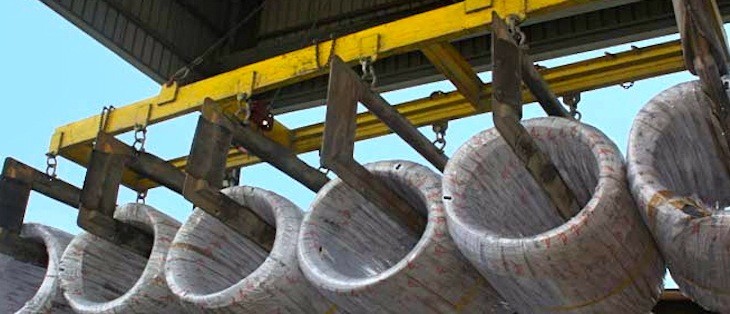Tonnage dips on the Arkansas River, ‘rebound’ expected by one port operator
by August 19, 2021 5:05 pm 771 views

Steel shipments at the Port of Fort Smith.
Tonnage shipped on the Arkansas River between January and July is down 2% compared with the same period of 2020, with one port operator blaming some of the decline on President Joe Biden’s decision to halt the Keystone pipeline project.
River traffic in the past two years has struggled through historic flooding and an economic slowdown induced by the COVID-19 pandemic. River tonnage in 2019 totaled just 8.48 million tons, down 22% from 2018. But tonnage was up 22% in 2020 to 10.322 million tons.
Tonnage shipped on the river during the first seven months of 2021 totaled 6.026 million tons, down compared with the 6.136 million tons during the same period in 2020. July shipments totaled 889,801 tons, up slightly from the 887,000 tons in July 2020.
Inbound shipments – those coming from off the river system – totaled 2.253 million tons during the first seven months of the year, up 8% compared with the same period in 2020. Outbound shipments totaled 2.056 million tons, down 3% compared with the same period in 2020. Internal shipments – those sent between port operations on the river – totaled 1.826 million tons, down 13% compared with the same period in 2020.
Traffic improved in July and August with September orders looking good, said Marty Shell, president of Van Buren-based Five Rivers Distribution, which has port operations in Fort Smith and Van Buren. He also said the port of Fort Smith is active again after finally repairing damage from the 2019 flooding.
“Tonnage is starting to see a rebound. … Steel is still hard to nail down with China slowing down and other factors still in play like tariffs. Bulk feeds and fertilizers have been heavy, and with the new port of Fort Smith coming back since the 2019 floods we are hoping for good things to come. We deserve a little good fortune since the tariffs, floods, and coronavirus,” said Shell, who is also a member of the Arkansas Waterways Commission.
Bryan Day, executive director of the port of Little Rock, said a reduction in steel pipe after President Biden halted the controversial Keystone pipeline has slowed activity at the port. Welspun Pipes, an India-based company that operates in the port, had contracts to produce pipe for the project. About 600 people were employed at Welspun prior to the Biden action.
“For the Port of Little Rock, the Biden administration’s philosophy on fossil fuels and the cancellation of the Keystone pipeline have drastically impacted our overall tonnage. We do believe that tonnage will slowly increase and the port will return to average and above average tonnage in future years. It could be late 2022 before we see this increase though,” Day said.
Day also noted that the U.S. Corps of Engineers worked on several locks during the summer which “delayed scheduled loadings and affected overall barge activities.” He said through July the port has loaded or unloaded 213 barges with 317,000 net tons of cargo, down 13% from 244 barges and 370,000 tons during the same period of 2020.
The Arkansas River system is 445 miles long and stretches from the confluence of the Mississippi River to the Port of Catoosa near Tulsa, Okla. The controlled waterway has 18 locks and dams, with 13 in Arkansas and five in Oklahoma. The river also has five ports: Pine Bluff, Little Rock, Fort Smith, Muskogee, Okla., and the Tulsa Port of Catoosa in Oklahoma.
Following are the top five shipment categories by tonnage for the first seven months of 2021, with the percentage change from the same period in 2020.
• Sand, gravel, rock: 1.839 million tons (down 9%)
• Chemical fertilizer: 1.342 million tons (up 7%)
• Wheat: 652,399 tons (down 13%)
• Iron & steel: 606,604 tons (up 6%)
• Soybeans: 498,572 tons (down 10%)
